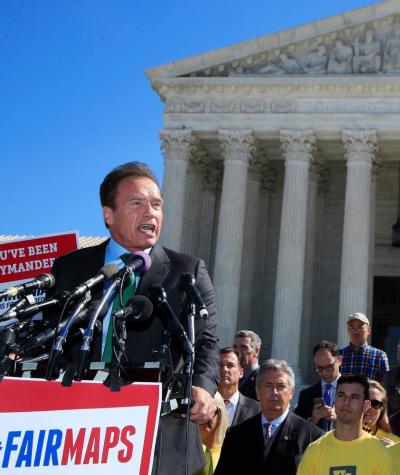With the For the People Act (H.R. 1/S. 1) under consideration in the Senate, some politicians in Washington are nervous about losing their power over the redistricting process because the bill ends gerrymandering at the congressional level.
The bill, which enjoys majority support among voters, would take away the power of politicians to pick their voters by redrawing district lines. This bill must pass because elections should be determined by voters, not politicians who draw maps.
There are several prominent politicians on the right who support the movement to end gerrymandering because they know this anti-democratic practice needs to end.
“I firmly believe there should be an independent process for drawing districts. They should be based on geographic considerations, and they should be as compact and contiguous as possible,” said former Rep. Justin Amash of Michigan to The Detroit News on Oct. 3, 2018.
Ohio Gov. John Kasich and other Republicans have called gerrymandering “repugnant to the Constitution” and said that it makes “a mockery of our republican government.”
In a brief written by Kasich and other prominent Republicans to the Supreme Court, they wrote, “Partisan gerrymandering entrenches political parties against popular will; it polarizes legislatures and creates gridlock; and it engenders voter cynicism about a political system that has been rigged to achieve predetermined electoral results, potentially in opposition to their will.”
Arnold Schwarzenegger is another Republican against gerrymandering. The former governor of California adopted an independent redistricting commission (IRC) in California which he proposed and promoted because he knew it would benefit his state in the long-term.
Once he left office, Schwarzenegger formed the Schwarzenegger Institute to reduce partisanship in politics across the country.
IRCs are a voter-centric reform used to ensures that voters — not politicians — decide how electoral districts are drawn.
The structure of IRCs vary from state to state, but IRCs are meant to make the redistricting process more transparent and impartial by establishing standards for who can serve on the commission and criteria that must be followed when drawing district maps.
However, since most states do not have a ballot initiative process, state legislators have been generally unwilling to pass legislation that limits their ability to manipulate redistricting for partisan gain. States that have approved IRCs, like Utah and Missouri, have rolled back the reforms.
A poll conducted this year by the right-leaning R Street Institute found that 57% of Republican voters support IRCs.
In a 2019 op-ed co-authored by Maryland Gov. Larry Hogan (R) and Schwarzenegger, they spoke out about their concern that gerrymandering would worsen when the U.S. Supreme Court refused to set limits on gerrymandering in the case brought by Campaign Legal Center (CLC).
“These days, Republicans aren’t expected to take a stand against partisan gerrymandering. But as a governor and former governor, we’ve seen firsthand the terrible dangers of what President Ronald Reagan called an ‘anti-democratic and un-American practice.’”
On the governor of Maryland’s official website, Hogan announced the creation of the Maryland Redistricting Reform Commission. “We have some of the most gerrymandered districts in the country—this is not a distinction of which we should be proud.”
Partisan gerrymandering strips not just Democratic voters, but Republican voters of their rights to have their votes count equally and of their ability to elect candidates who truly represent their communities.
The For the People Act seeks to change this by requiring that each state establish an independent redistricting commission responsible for developing and enacting congressional redistricting plans.
This landmark bill also includes criteria set in place to ensure politicians and lobbyists don’t sit on the commissions, and provisions to ensure avenues for public input and transparency.
Congressional redistricting is broken, and a federal solution must address this problem. Every vote should count equally and every voice should be heard.
